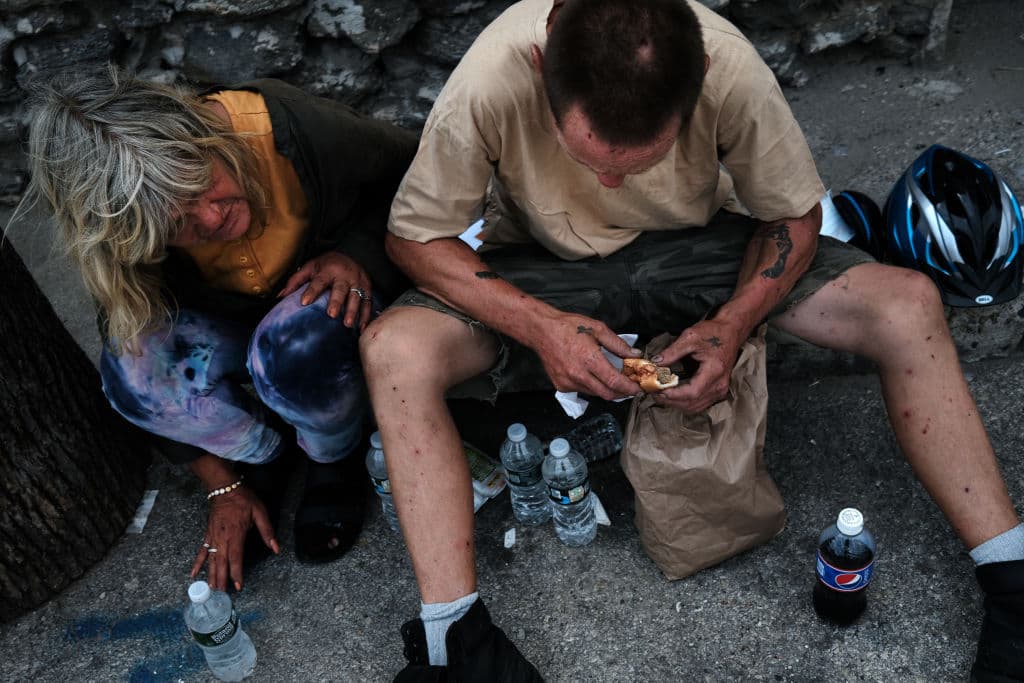Philadelphia Cracks Down on Notorious Kensington Open-Air Drug Market, Ground Zero of ‘Tranq’ Epidemic: Will Anyone Be Prosecuted?
Philadelphia’s mayor, like other Democratic leaders, is taking a tougher-on-crime approach. But ‘nobody talks about the prosecution aspect,’ one observer tells the Sun.

As Philadelphia plans a clean-up of a neighborhood that’s home to the largest open-air drug market on the East Coast, questions are emerging about whether the tough-on-crime talk by the city’s Democratic mayor will be backed up by actual prosecutions.
The city is planning to clear a homeless encampment on Kensington Avenue on Wednesday, in part of a larger strategy by Philadelphia’s mayor, Cherelle Parker, to revitalize the city’s notorious Kensington neighborhood — a squalid zone of homelessness, drug use, and prostitution – which has become “ground zero” for Pennsylvania’s opioid epidemic and the larger “tranq” crisis ravaging the East Coast.
The city’s move to clear the area is unfolding as politicians in blue states across the country are taking tougher stances toward open drug use and crime in a turnaround from some of the sweeping criminal justice reforms implemented in 2020.
Yet, in blue states from California to Colorado to Rhode Island, “nobody talks about the prosecution aspect,” a retired special agent of the Drug Enforcement Agency, Michael Brown, tells the Sun. “If there’s no prosecution, there’s no conviction, there’s no deterrent to low-level distributors. And people say, ‘Well, they’re only selling one or two grams.’ Well, it only takes a gram of fentanyl to kill 100,000 people.”
A true crackdown at Kensington will require an aggressive prosecution of anyone distributing even small amounts of drugs, he adds.
“You want to bring down the death rate, then you have to deal with the small amounts, because it’s small amounts that are killing people. Nobody’s taking a kilo of fentanyl and dying, they’re taking a gram, a half a gram, and they’re dying.”
Ms. Parker — whose office did not immediately respond to a request for comment — in April unveiled details of a five-phase Kensington Community Revival plan that focuses on implementing a “heavy police presence” in the area that includes “arrests for narcotics, prostitution, quality-of-life crimes, and other criminal acts.”
While the tougher-on-crime approach and promise of arrests has been a breath of fresh air for some residents tired of rampant public drug use, the city’s far-left district attorney, Larry Krasner, has veered away from prosecuting low-level drug offenses. In his first year in office, prosecutors filed 20 percent fewer cases than they did the year before, WHYY reported.
“Finally, we have a mayor of Philadelphia who’s willing to address and tough talk about arrests. Where’s the tough talk about prosecutions?” Mr. Brown asks, adding that the problem is low-level distribution, as dealers are allowed to sell small quantities without fear of penalty. “If you don’t create an environment where you have zero tolerance for distribution in Kensington, those dealers will simply come back, and they will continue to sell.”
The mayor’s plan details an approach “to attack the decades of open-air narcotics trade, addiction, homelessness, violence, and criminal activity.” The city will employ a “Weed and Seed” strategy, the plan notes, “in which local law enforcement agencies and prosecutors focus on ‘weeding’ out criminals who engage in violent crimes and drug abuse, and ‘seeding’ human services encompassing prevention, intervention, treatment, and neighborhood revitalization into the area.”
The district attorney’s office did not immediately respond to questions from the Sun about whether it would ramp up prosecutions in connection with the mayor’s crackdown.
“If you surge into Kensington with police operations to identify and remove those dealers, what’s to keep those dealers from coming back?” Mr. Brown says, adding that his experience in the DEA has shown him that the solution is to have minimum mandatory sentencing, as nobody wants to risk the prospect of years of jail time to sell a few grams of narcotics. “You got to hit people hard, got to put the threat out there, ‘We catch you selling drugs in Kensington, you’re going to go to jail for a minimum period of time ranging from maybe one year to five years.’”
As the city under Ms. Parker’s administration has pulled back support for programs that provide supplies to drug users, Mr. Brown says Philadelphia should focus on pushing users into treatment and expanding access to healthcare, hospitals, and housing. Services that give users supplies such as clean syringes are “enabling” drug usage and addiction, Mr. Brown says, and it keeps individuals in the “user mindset.”
“By providing those services, individuals are now getting severe necrosis because they’re using fentanyl, which has xylazine. So they’re opting to stay on the street as their limbs literally are rotting off,” he says. “So maybe you saved them today from a fentanyl overdose, but tomorrow they have a greater risk of a fentanyl overdose, in addition to severe health concerns related to necrosis.”
The ample free services at Kensington, as well as the lack of arrests and prosecution in recent years, have drawn in a lot of non-locals, Mr. Brown adds, saying they see it as “an outdoor hotel with room services.”
“It’s the perfect petri dish,” he says, “for long-term substance addiction, overdose fatalities, and continuing extensive health care issues.”

